Emilia Clarke: ‘I can’t demand dragons forever’
As she takes on her first starring role since Game Of Thrones, Emilia Clarke opens up on what Daenerys taught her about “lady balls” and why she regrets not giving GoT fans “the perfect ending”.
Stellar
Don't miss out on the headlines from Stellar. Followed categories will be added to My News.
It was playing the very blonde Daenerys Targaryen on the cultural juggernaut Game Of Thrones that propelled brunette actor Emilia Clarke to fame.
Coming off the back of the most successful show in television history would surely give an actor pause when considering their next project, so all eyes are now on the 32-year-old Londoner as she embarks on her post-Thrones career.
But Clarke doesn’t seem bothered by the largely furious public reaction to the hit series’ final season, and explains the very personal reasons she chose the heartwarming holiday film Last Christmas as her first follow-up project.
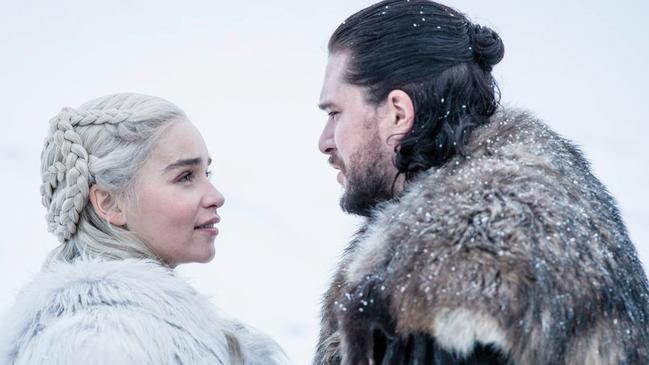
The response to the final episodes of Game Of Thrones was overwhelmingly negative. With some distance, how do you feel about that reaction?
I was too busy focusing on my own reactions to really pay too much attention, if any at all. The only thing I felt truthfully sad about was that [executive producers] David [Benioff] and Dan [Weiss] are my really good friends, and so it’s for them that I feel heartbreak, because it’s theirs.
But there were certainly people who claimed they felt cheated by the ending...
Everyone is going to have their own opinion and they’re fully entitled to them. It’s art and it’s to be dissected and taken on in whatever individual way you wish.
And if you’re sad that the show is done and you’re sad because you enjoyed watching it, then that’s sad. It sucks this wasn’t the perfect ending that people were hoping for, but I truly believe we would never have made everyone happy.
MORE STELLAR:
What it’s like to be a member of Westboro
How do I tell my colleague they have bad breath?
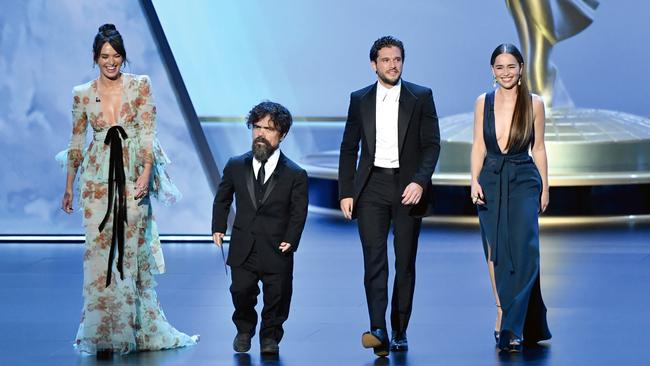
Daenerys’s ending was a shock to many. How did you cope with the online response from viewers?
I don’t Google myself; I don’t read reviews. Which makes it sounds like I’ve got my sh*t together, but it doesn’t help me to hear someone say, “You’re great,” and it doesn’t help me to hear someone say, “Hey, you piece of sh*t, why are you so fat?” Those are the extremes you deal with when you read about yourself on the internet, so I simply don’t.
Did you feel pressure when choosing which project to follow Game Of Thrones with?
I don’t feel pressure to follow up the show because it’s unfollowable. I’m not going to go off and be like “Oh well, dragons are my thing...” I can’t be a crazy woman demanding dragons forever! “These aren’t as good as my last dragons!” Can you imagine? [Laughs.]
What did playing Daenerys teach you about yourself?
Oh my goodness, she taught me about lady balls. She taught me what it feels like to be in a room and be heard. She wielded such power, calmness and such poise.
She had a fierce intensity and made some incredibly tough choices. In Season 3, she had to start busting some balls, and as a 25-year-old standing in front of 500 extras, 150 crew members, six cameras, a drone, dragons and fire, I had to bring it.
I felt like if I can do that, then the red carpet doesn’t feel so scary to me at all. So there’s a certain kind of self-belief that rubs off on you as a person.
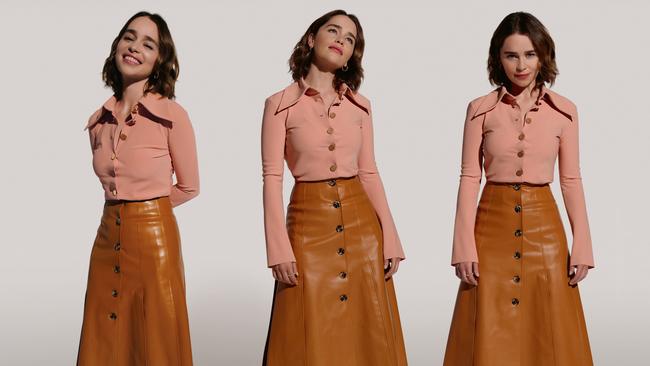
Your next project is playing the female lead in a festive film called Last Christmas. What drew you to that role?
It was pitched to me like, “Emma Thompson has written a movie.” And I was like, “I don’t even need to read it. Yes, I’m in, I’m 100 per cent in.” I think she is the greatest human and with the double combo of Paul Fieg directing, it was an absolute no-brainer. Worst-case scenario, we were at least going to have a wonderful time.
The film really shows off London at Christmas, which is very different to what we see here in Australia.
I’m used to the magic and allure of London at Christmas — they kind of take it to the next level there, and our amazing set designers added enormous amounts of fairy lights to every scene. We knew where we were going to be filming before we got anywhere close because I could see the lights from a mile away.
What was it like working with Emma Thompson?
She’s just inherently got this maternal side to her; every individual person on set feels heard, seen, protected and loved. I can very confidently say it was my favourite filming experience I’ve ever had, and she was a massive part of that.
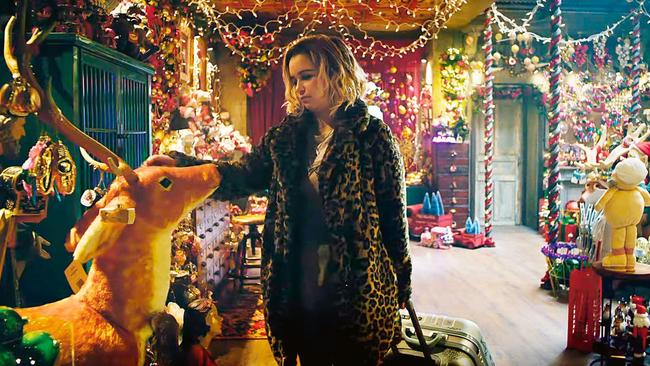
The film celebrates diversity and also tackles the subject of Brexit.
You can’t talk about England without talking about Brexit right now. If we’re going to give you a little love letter to London, then the truth is that London has diversity — it is an incredible hotpot of third or fourth generations of people who have come here and stayed true to their cultures and heritages and celebrated that. We believe that adds to the joy of London.
Your character Kate is recovering from a life-threatening illness. Having survived two aneurysms yourself, did her situation resonate with you?
Absolutely. It was uncanny reading the script because it’s my life at this point. I have the benefit of having space between myself and my sickness and what you see through Kate is the fear of what happens when your body fails you in some way.
That can push people in different reactions. I didn’t stop working so I didn’t give myself enough time to think it over.
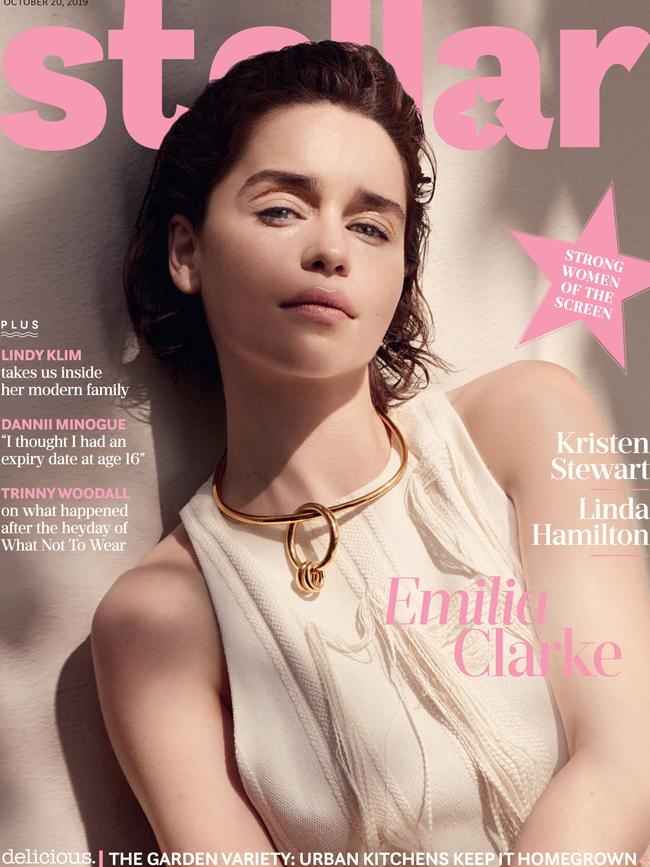
How did it change your approach to life?
It’s not one of those things that happens to you and you’re like, “I’m happy to be alive.” It’s the complete opposite of what happens. You spend a good few years of thinking, “I’m going to die.” You can feel incredibly scared about simple things and it’s the act of living that can, in any way, soften that.
I was in Game Of Thrones at the time — I couldn’t think about the brain injuries. I was too busy thinking about what the show was and what Hollywood was and what being a woman was. If I’d not had such a taxing, demanding job, I might have reacted differently.
After you finished Game Of Thrones, did you feel a sense of freedom?
Absolutely. It really was the greatest moment of my life, but there is an absolute freedom that Thrones has given me — a gift-wrapped present in a little bow saying, “You’re now financially secure enough to not have to panic, so what do you want to do?”
That kind of freedom is wonderful. I could never see it during the time I was filming, because I was too close to it.
Last Christmas is in cinemas from Thursday, November 7.
